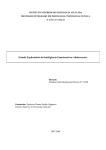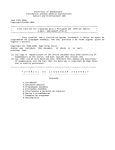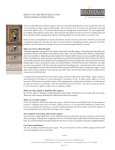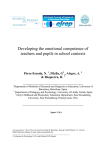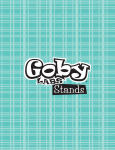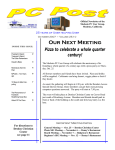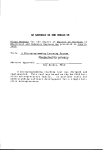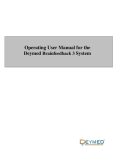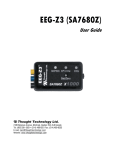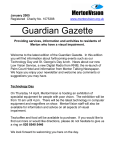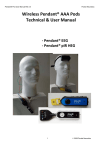Download March 2012 Newsletter - John Pellitteri, Psy.D.
Transcript
PSYCHOLOGY NEWS Dr. John Pellitteri March, 2012 Volume 2, Issue 3 Treasure Health! I feel like I’ve been run over by a bull. I finally caught that terrible stomach flu (or perhaps the black plague) that everyone has been getting, and it slammed me into the hospital for fluids and medicine. Thanks to Lady Vicodin, I’ve started to finally come out of it. In one of my delirious drug-induced comas, a thought popped into my head, that I need to treasure my health when I have it. Do you enjoy things this much? When I was in college, I got a scratch on my retina. Man, that was painful; it gave me headaches and I couldn’t see—everyday was a journey through pain until it healed. I sometimes remember that, and think to myself, “everyday I don’t have an eye infection is a good day.” No matter what stressful things I have to do, it’s easier without an eye infection. The Pellitteris have a saying, “Things can always get worse.” I don’t see this as a cynical Table of Contents Page 1……………..Welcome! saying; I see it as a recognition that things Page 2……………..Training and Me aren’t that bad. It’s a way to look on the Page 3……………..What’s your TQ? Page 4……………..TQ testt bright side—in psychological terms, a positive Page 5……………..Classified Ads appraisal. So although the illness I just had was absolutely terrible, at least it’s over! And Contact/Feedback: [email protected] how great would it be if I was better able to www.DrJohnPellitteri.Com enjoy my days when I think, “at least I’m not home in bed with the stomach flu!” Hope Archived Newsletters on Website you’re well! Thanks also to all my family and friends TO BE REMOVED FROM THIS NEWSLETTER: with their nice texts and If you are receiving my newsletter against your will—all messages! you need to do is let me know and I will delete you forever! I certainly apologize! 1 March, 2012 Volume 2, Issue 3 Continuing Training and me Maybe I have a touch of attention-deficit disorder. Maybe a good hard slap of it. When I was younger, the worst thought I had about a career is being forced to wake up everyday, put on a tie, and sit a desk for eight hours. First off, eight hours sounded like an eternity to me—how can anyone do anything for eight hours straight? As I progressed through my education, and particularly in my doctorate program, I learned to stretch my day. Seven or eight hours of school, four or five of internship, and then a couple of hours of work turned into a 6:00 a.m. to 8:00 p.m. daily grind. Although this was very difficult, it did extend my life throughout the day—that is, when I get off of work at 4:00 p.m. I still feel like I have a lot of time to do other things. One of the most gratifying parts of my work-life is that balance between different jobs. I am not solely dependent on one particular endeavor to fulfill my career needs. I have my private practice, my counseling, and my teaching. Through each of these avenues, there are different aspects of the work where I can continue to be intrigued. In the service of my private practice, I just attended a fiveday training in biofeedback—something I see as an adjunct to my neurofeedback. My take on all training and seminars nowadays is that if I can take just one thing from it, it’s worth my time and money. This particular training gave me several interesting ideas and areas for further study. One particular thing I learned was about heart-rate variability. We did a lab assignment where we found our optimum “resonant” frequency—that is, the best breath rate to match your heart rate. It seems that our hearts are programmed to best perform at a certain breath rate, usually between five and seven breaths per minute. By measuring where your heart best responds in different breath rates, you can see which rate is your optimum rate. It turns out my breath rate is 5.5 breaths per minute. It was fascinating to see that when measured at 6 breaths per minute and 5 breaths per minute, my heart didn’t respond anywhere near the 5.5 level. So funny how half a breath makes. I’ve been training myself to breath at this rate, and am attempting to lower my blood pressure, which is one of the benefits of this training, among others. I would like to get off this high blood-pressure medication I have been taking for years, and the technique looks promising. Fore exam2 ple, I took my blood pressure in the morning and was 143/91—too high (a good blood pressure is 120/80). I’ve been higher; when I was off of medication, I think my record was 191/119, which is so high one should probably be hospitalized before they pop like a water balloon in the summer sun. I sat in a chair, and did my breathing at my resonant frequency for several minutes, and retook my BP. It went down to 125/85. I was pretty amazed, and took it three more times to see if it was stable over about half an hour, and it was. I will continue to work on this training, and see if I can start to titrate off my medication (for legal reasons, I’ll say I’m going to consult a physician). I’ll keep you posted on the progress. Once I can afford the sensors I need (they are about $1250) I would be happy to practice on you and help you identify your optimum resonant breath frequency. Let me know if you’re interested. One other aspect of continuing training I enjoy at the professional level is that you get such concentrated classes. A “Carnegie Unit” - or the basis of a class unit which comes from a somewhat arbitrary notion - is the amount of time one has to put in for a “credit.” At Mt. SAC, 18 hours gets you a unit. Through this professional class, I get 45 hours of instruction in five days, almost equivalent to a full class in a few days. Although these are rough days, it is worth it for my schedule...perhaps for yours, too, in the future! March, 2012 Volume 2, Issue 3 What’s Your “TQ”? Intelligence Quotient, or “IQ” is a measure of your mental age divided by your chronological age; this gives us a brief index (sometimes erroneous) of your overall level of cognitive functioning. One’s “EQ,” or Emotional Intelligence,” is a measure of one’s ability to reason and manage emotions. Salovey and Mayer (1990) propose four factors: perceiving emotions, reasoning with emotions, understanding emotions, and managing emotions. Along these lines, I would propose that we are beginning to see another type of intelligence emerge—namely, one’s “Technology Quotient.” This might have several factors as well: Ability to understand technologies, ability to extract needed and desired rewards from technologies, and ability to communicate and enhance relationships with technologies. Let’s take a look at each one of these. 1) Ability to understand technologies. Are you the type of person who rips open the package and starts to play with the new gadget? Or perhaps you read the manual thoroughly from cover to cover before starting. Or maybe you are frightened of it and give up in frustration when it doesn’t work right away. I think that our culture is progressing toward many shared terms and concepts, such as “cut-and-paste” and “save” and “open” - these terms are used by most computer programs such that they are no longer proprietary, but conceptual in how we see technology. The days of learning a completely new language are dwindling—however, one with a high “TQ” would be able to look at a new computer program, phone, or other device and translate what that particular technology needs insofar as making it work. My iPhone, for example, needs me to slide my finger across the screen to the next, while my Word document wants me to use the slider...same concept, but different “languages.” 2) Ability to extract rewards from the technology. Many of our day-to-day devices can do much more than we ask of them. With the number of programs and applications, the number of things we can do is almost infinite. A person with a high TQ would be able to utilize the most necessary functions of the devices they use—that is, a business person who can print a receipt from the phone, and the truck driver who can adjust their GPS so as to miss a traffic jam is utilizing their technology to enhance their lives. An individual with a low TQ might spend an hour going to the bank, waiting in line, when they might have the capability through their computer to do the same procedure automatically, if they could but extract that functionality from it. 3) Ability to communicate and enhance relationships. Being available to the people you want to hear from in a time frame you have designated is another example of TQ. A whole text language is emerging, within the constraints of technology and practicality, and those with a high TQ are responding in ways that are and accurate in regard to information and emotion. Conveying your thoughts and feelings is a developing skill—those with lower TQ’s miss information—both because they can’t access it in a timely manner and because they may not be able to decode nuances in the medium. Many relationships are begun online now, and the ability to present yourself accurately and interpret others is a challenge and skill. Increasing your TQ can make your life easier and more connected. Some people find this burdensome, however, and the thought of learning new ways of doing things is daunting and scary. Which one are you? Challenge yourself to add a new communication channel or learn3an app that can help you save time! March, 2012 Volume 2, Issue 3 Technology Quotient Test Circle one of the following 1. I am reachable by cell phone 2. If someone emails me, I get back to them the same day 3. I use text 4. I read a user’s manual before installing a new program 5. I email myself a document to save it for later 6. I have changed my email address 7. I have several email addresses that route to one address 8. I write letters the “old-fashioned” way (paper and pencil) 9. I can program a DVR to record a program 10. I have a smart phone 11. People tell me they sent me a message I didn’t get 12. I backup my files 13. I can scan a picture and forward it to someone 14. I know what version iPad is currently out 15. I know when it is appropriate to check my phone Frequently Frequently Frequently Frequently Frequently Frequently Yes Frequently Yes Yes Frequently Frequently Yes Yes Yes Often Often Often Often Often Often Sometimes Sometimes Sometimes Sometimes Sometimes Sometimes No Often Sometimes No No Often Sometimes Often Sometimes No No No Neve r Never Never Never Never Never Never Never Never Scoring: Score +3 for “Frequently” on questions 1,2,3 Score +1 for “Yes” on questions 7,9,10,13,14,15 Score –1 for “Sometimes” on questions 1,2,3,4,6,11 Score –2 for “Never” on questions 1,2,3,5,12 Score 0 for question 8, because it doesn’t matter 10-14 Tech savvy genius—text your mom and tell her she should be proud...unless she has a low TQ... 7-10 Work to do! Catch up or be left behind! >7 You’re not reading this because you couldn’t open the file. Mash on your keyboard and we’ll send help 4 Classified Ads New Section of Newsletter! Free Neurofeedback Assessment Have a service or announcement you’d like to make? Let me know! All appropriate ads will be included—I make no guarantees in regard to the ads that are placed...it’s like a bathroom wall! Well...maybe not like that, but you get the idea. I am currently offering a free assessment using our Quick-Q program to illuminate potential brain-based issues. Assessments are done primarily on Friday mornings at my office in Claremont, and take about 20 minutes. For more information or to be put on waiting list, contact me at [email protected] Podcast Interested in hearing our podcast goodness? We are currently exploring ways for you to download the mp3 file. Let me know if you are interested...we’d love your feedback. Now on episode 5 with special guest! John Pellitteri (Psychologist) Doug Evans (Everyman) DISCUSSION FORUM! We now have a forum through Google Groups! This will be a place to discuss psychological issues and ask and answer questions. To be invited to this list, you must send an email to our Forum Manager: Heather Lopez at [email protected] or me at [email protected] She will “invite” you, and you can then adjust your Warning: Do Not Go to TALKTOTHEDEADONLINE.COM and whatever you do, don’t click on one of the banner ads. And don’t think of a monkey! 5








